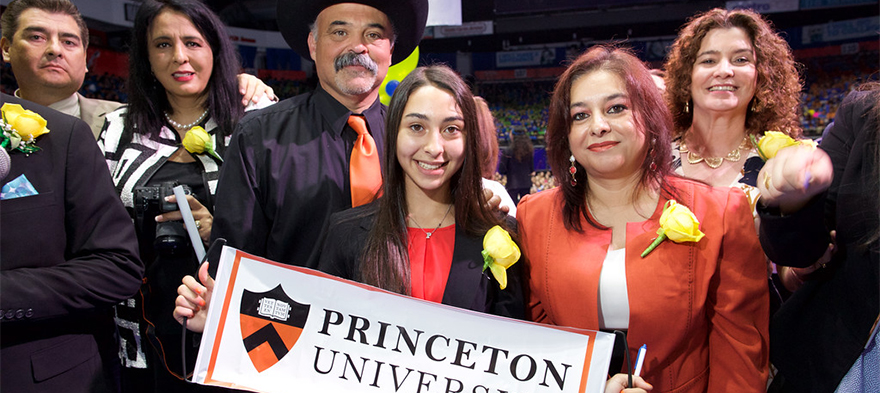
Dec 1, 2016 12:00:00 AM
---
I first enrolled at IDEA Quest College Preparatory when I was in sixth grade. We’d heard the school’s focus was on preparing students to get to and through college. I attended a traditional public school before IDEA and I did well there, but honestly, it was easy. I didn’t think anything would really come from it, or that I was even capable of attending college. I studied and took notes, and when I finished math problems with time to spare, I was taught to wait for everyone else. As I sat in classes, I spent most of the time listening, completing my work, and sitting in my seat. I wasn’t provided any hands-on experiences or activities, my classmates and I didn’t collaborate on projects and assignments, and I certainly wasn’t pushed. [pullquote]I was fine getting by with good grades and nothing more. [/pullquote]My teachers didn’t talk with us about planning for the future, and college was not something we talked about during class. When IDEA came to our community, my family and I were excited to apply. We heard about IDEA’s focus on college during meetings and info sessions, but I still didn’t think it was possible for me to go to college. I was nervous about this new school, but I was also excited by the prospect of something better, even if I didn’t know quite what that was yet. And so my mom filled out applications for my two brothers and me to attend IDEA Quest Academy and College Preparatory. I was jittery on my first day. Would the work be too hard? Would my classmates like me? So many questions filled my head. In my first year at IDEA, I learned there was something different about this school. No longer was I sitting in class, doing the bare minimum. I was being challenged for a change. My teachers were always activity-based—they got us out of our seats, debating each other, tackling projects. I worked so hard in my 11 Advanced Placement classes, and sometimes the idea of not doing my homework or studying that extra hour, was tempting. At times it felt like I was running a marathon. And it was a marathon. IDEA made it clear that a lot of work went into getting to college. A lot of schools don’t tell you that or help you along the way. We took a class on the ins-and-outs of applying to college, learning about financial aid, scholarships, writing statements of purpose, and more. My classmates and I also got to visit college campuses. For the first time in my life, I could really see myself in a college classroom. Mrs. Guzman, my favorite counselor, made it her top priority to help seniors in their transitions to college. She coached me as I applied to QuestBridge, a nonprofit program that connects high-achieving students to scholarships and educational opportunities at colleges and universities. [pullquote position="right"]But Princeton...could I really do it?[/pullquote] Could I succeed at an Ivy League school hundreds of miles away from my family and friends? I took the risk and applied. A month or so after applying, I saw a decision email from Princeton in my inbox. I just couldn’t open it. Not knowing what to do, I ran to Mrs. Guzman. She saw my anxiety and agreed to open the email for me. Mrs. Guzman screamed, and I immediately started screaming, too. I was accepted to Princeton on a full scholarship. I immediately called my mom. She was driving back from a business trip in Corpus Christi, and had spotty cell-phone service. Later, she told me with a smile: “I knew it. I never had any doubt. My Carolina is remarkable.” And now, I was college bound, along with my classmates. In fact, 100 percent of my classmates at IDEA were accepted to college. We all set goals to make it to college and we accomplished it together. In April, we stood in the State Farm Arena in Hidalgo, Texas before a crowd of 12,000 people and announced where we planned to attend college as part of College Signing Day, a celebration of IDEA seniors and their hard work.---
My first semester here at Princeton has been wonderful. I’m studying molecular biology and am grateful for the work ethic I developed at IDEA because it helped prepare me. You can’t be passive when it comes to your future. You have to take control of the direction of your life. IDEA taught me that. And so much more.Carolina Cantu, a 2016 graduate of IDEA Public Schools, is a freshman at Princeton University studying molecular biology.
The story you tell yourself about your own math ability tends to become true. This isn’t some Oprah aphorism about attracting what you want from the universe. Well, I guess it kind of is, but...
If you have a child with disabilities, you’re not alone: According to the latest data, over 7 million American schoolchildren — 14% of all students ages 3-21 — are classified as eligible for special...
The fight for educational equity has never been just about schools. The real North Star for this work is providing opportunities for each child to thrive into adulthood. This means that our advocacy...
Your donations support the voices who challenge decision makers to provide the learning opportunities all children need to thrive.
Ed Post is the flagship website platform of brightbeam, a 501(c3) network of education activists and influencers demanding a better education and a brighter future for every child.
© 2020–2024 brightbeam. All rights reserved.
Leave a Comment